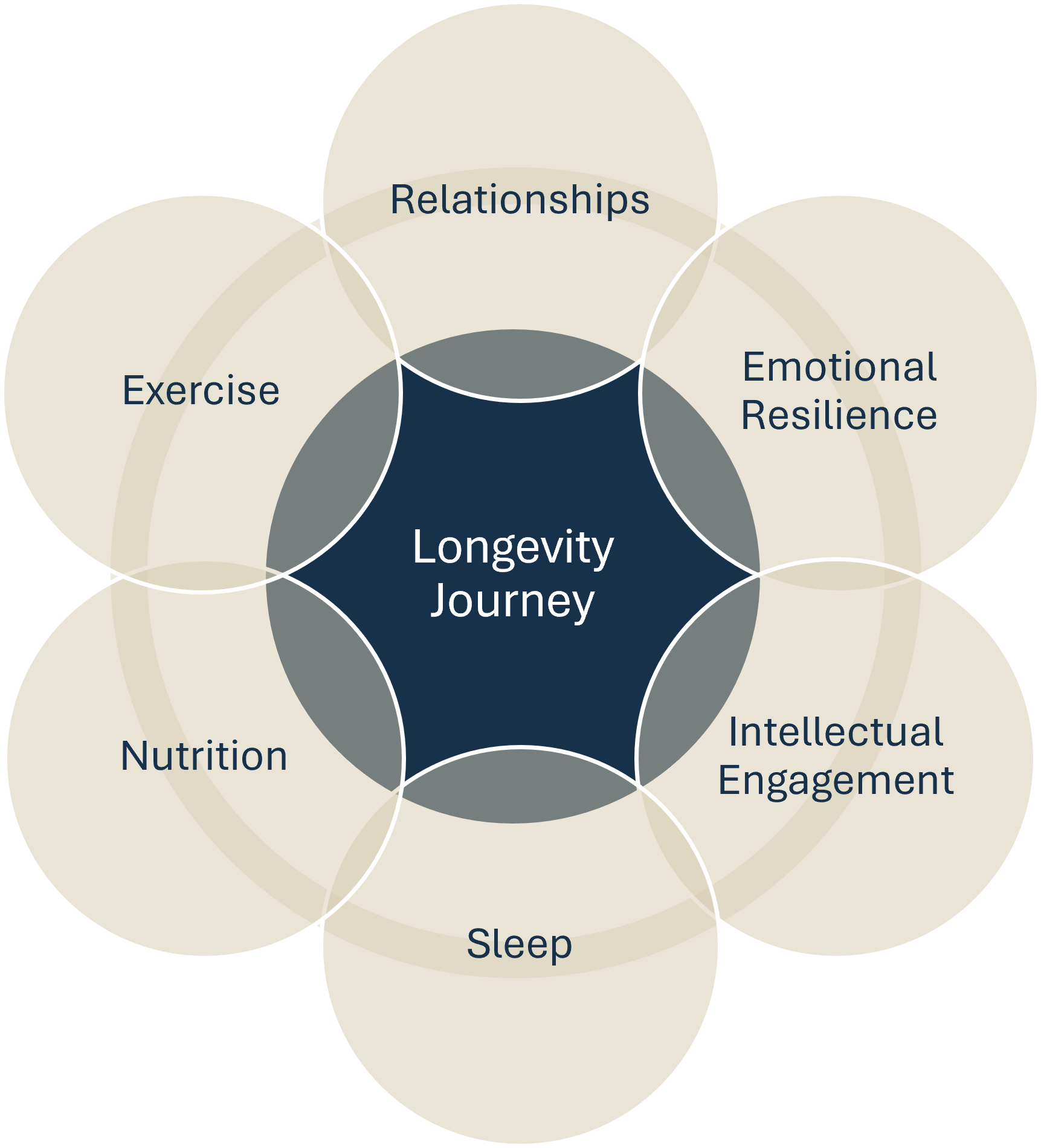


As we navigate through the complexities of modern living, we encounter an array of influences that shape our health and well-being. From the foods we consume and the physical activities we engage in, to our mental health practices and social connections, each choice we make contributes to our overall longevity.
Research shows that factors such as nutrition, exercise, sleep, our relationships, our emotional resilience, and intellectual engagement play crucial roles in determining how well we age.
Exploring the Provisions for Your Journey
Nutrition plays a pivotal role in the quest for longevity, significantly influencing both the length and quality of our lives. A balanced diet rich in whole foods provides the essential nutrients our bodies need to function optimally, supporting everything from immune health to cognitive function. Research consistently shows that diets high in fruits, vegetables, whole grains, lean proteins, and healthy fats are linked to reduced risks of chronic diseases such as heart disease, diabetes, and certain cancers.
Moreover, the concept of "food as medicine" underscores how specific nutrients can enhance cellular repair, reduce inflammation, and promote overall vitality. Antioxidant-rich foods, for instance, combat oxidative stress, while omega-3 fatty acids support brain health and heart function.
Beyond physical health, nutrition also affects our mental well-being. A well-nourished body can lead to improved mood, better stress management, and increased energy levels, all of which are essential for a fulfilling life. As we age, our nutritional needs evolve, making it crucial to adapt our eating habits accordingly.
At the Inner Curator Institute, we recognize that achieving longevity is a multifaceted journey supported by all six key pillars: nutrition, exercise, sleep, relationships, emotional resilience and intellectual engagement. While all of these pillars are crucial for a fulfilling life, we focus on four (sleep, relationships, emotional resilience and intellectual engagement), as there are already many excellent resources available for nutrition and exercise. Our favorites for nutrition include (unpaid advertisement):
Exercise is a cornerstone of a long and healthy life, playing a vital role in enhancing both longevity and quality of life. Regular physical activity helps maintain a healthy weight, strengthens the cardiovascular system, and boosts overall fitness, significantly reducing the risk of chronic diseases.
Engaging in exercise not only benefits the body but also supports mental health. Physical activity stimulates the release of endorphins, often referred to as "feel-good" hormones, which can alleviate stress, anxiety, and depression. This positive impact on mental well-being is crucial for maintaining a vibrant, fulfilling life as we age.
Moreover, exercise promotes better mobility and flexibility, reducing the risk of falls and injuries in older adults. It enhances bone density, supports muscle strength, and improves balance, all of which contribute to greater independence and resilience.
Incorporating a variety of activities—such as strength training, aerobic exercises, and flexibility routines—into daily life can optimize health benefits and keep the body functioning at its best.
At the Inner Curator Institute, we recognize that achieving longevity is a multifaceted journey supported by all six key pillars: nutrition, exercise, sleep, relationships, emotional resilience and intellectual engagement. While all of these pillars are crucial for a fulfilling life, we focus on four (sleep, relationships, emotional resilience and intellectual engagement), as there are already many excellent resources available for nutrition and exercise. Our favourites for exercise include include (unpaid advertisement):
Sleep is often overlooked in the conversation about longevity, yet it is a fundamental pillar of health and well-being. Quality sleep is essential for physical, mental, and emotional restoration, playing a crucial role in longevity. During sleep, the body undergoes vital processes such as tissue repair, muscle growth, and immune function enhancement.
Establishing healthy sleep habits can enhance sleep quality. Below you can find a brief overview on the key aspects, with link to our corresponding blog articles for more details!
Prioritizing sleep is not merely about avoiding fatigue; it is an essential investment in our long-term health.
Sleep duration
Various public health authorities have established guidelines to help people of all ages achieve the right amount of sleep. The National Sleep Foundation (NSF) is one of the leading organizations providing comprehensive recommendations on sleep duration based on age. According to their guidelines, adults aged 18 to 64 should aim for 7 to 9 hours of sleep per night, while older adults aged 65 and above may require slightly less—around 7 to 8 hours. For children and teenagers, the recommendations vary significantly.
Pre-bedtime routine
Establishing a pre-bedtime routine is a powerful way to signal to your body that it’s time to wind down and prepare for sleep. Various studies and expert recommendations highlight the importance of a consistent routine in enhancing sleep quality and duration.
Sleep Environment
A conducive sleep environment is essential for achieving quality rest and promoting overall health. Various studies and expert organizations emphasize the significance of factors such as light, noise, temperature, and comfort in creating an optimal space for sleep.
Strong, meaningful relationships are fundamental to our well-being and play a crucial role in promoting longevity. Engaging with family, friends, and community fosters a sense of belonging and support.
Building and nurturing relationships is an investment in our health. Prioritizing quality time with others—whether through shared meals, community events, or simply checking in—can enhance our emotional and physical well-being.
Emotional resilience—the ability to adapt to stress, adversity, and change—plays a crucial role in promoting longevity and overall well-being. In an ever-changing world, our capacity to navigate life's challenges significantly impacts our physical and mental health.
Building emotional resilience fosters a positive mindset and enhances coping strategies. This mental fortitude allows individuals to bounce back from setbacks and maintain a sense of purpose, which is essential for a fulfilling life.
Intellectual engagement is a vital component of longevity, significantly influencing both cognitive health and overall well-being. Staying mentally active through lifelong learning, problem-solving, and creative pursuits helps to maintain cognitive function and can delay the onset of age-related decline. Engaging in intellectually stimulating activities—such as reading, puzzles, or learning new skills—promotes neural connectivity and enhances brain plasticity, which are crucial for maintaining mental agility.
Moreover, intellectual engagement fosters a sense of purpose and fulfillment, contributing to emotional well-being. Individuals who actively seek out new experiences and challenges often report higher levels of life satisfaction and resilience. Incorporating intellectual pursuits into daily routines—whether through classes, hobbies, or discussions—can lead to a richer, more vibrant life.
Ultimately, nurturing our minds is just as essential as caring for our bodies, ensuring we thrive as we age.